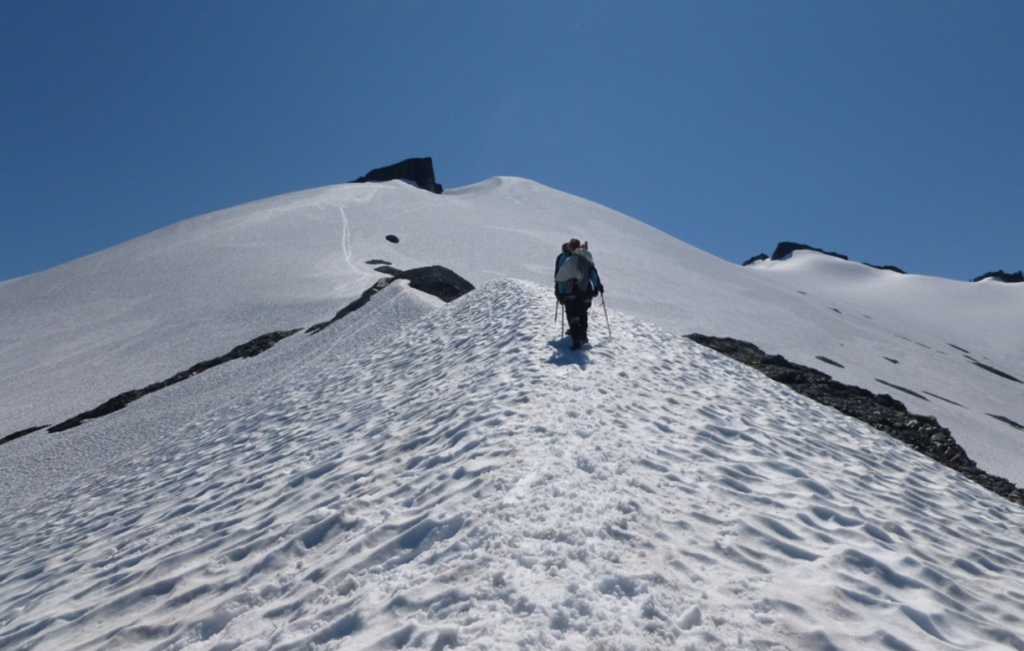The Pacific Northwest’s leading ecology think tank, Sightline Institute, this week issued three linked papers intended to give Washington State voters an “impartial and informed” analysis of Initiative 732, the Nov. 8 ballot measure to establish the nation’s first statewide carbon tax.

Ruth Mountain in the North Cascades. Snow was deep when we summited it in late August 1972, before the onset of rising temperatures. Photo courtesy of peakery.com.
The takeaway is clear: the Sightline papers blow away the objections that for months have clouded perceptions of I-732 and threatened to capsize the extraordinary grassroots movement led by CarbonWA that last year collected 350,000 signatures and made the Evergreen State the epicenter of carbon tax organizing.
Here are key quotes from the Sightline papers:
- “We find I-732 a worthy policy to put Washington on a path to cutting pollution and encouraging clean energy while also helping low-income families by making Washington State taxes less regressive.”
- “I-732 would give Washington the continent’s, if not the world’s, most potent, persistent, and comprehensive incentive to move swiftly beyond dirty fossil fuels and to a carbon-free future.”
- “I-732 is revenue-neutral, to the best of anyone’s ability to forecast it… [The argument to the contrary] is a red herring… I-732 is likely to be much closer to revenue-neutral than the [State Department of Revenue’s] forecast suggests… Even if the Department’s estimates are correct, I-732 will still be a rounding error… I-732 will likely have less than a 1 percent impact on state tax revenue for decades.”
- “Initiative 732 does exactly what the scientists and economists prescribe: it sets a science-based, steadily rising price on pollution. The citizens’ initiative covers most of the state’s climate pollution, makes the tax code more progressive, and is administratively elegant.”
- “I-732 would be the biggest improvement in the progressivity of Washington’s state tax system in 40 years.”
Individually and collectively, these statements demolish the major criticisms that have been leveled against the carbon tax initiative.
#1 validates CarbonWA’s claim that the carbon tax is economically progressive — a result of dedicating the lion’s share of revenues to lowering the regressive state sales tax, with other funds allocated to funding the Working Families Rebate — an extension of the federal Earned Income Tax Credit.
#2 validates the precept that the most potent way to eliminate carbon pollution is to tax it, and confirms the organizers’ belief that establishing the first U.S. statewide carbon tax could be a climate breakthrough.
#3 refutes the assertion by state budget analysts that the I-732 revenues won’t fully pay for the tax cuts, calling it a “red herring.”
#4 and #5 are icing on the #1-#2-#3 cake.
(We admit to having grabbed the five points from a CarbonWA press release; it’s late Friday afternoon here on the East Coast and we’re trying to wrap the week. But we did confirm each quote from the Sightline reports.)
Read the Sightline reports and see for yourself the care they took with their analysis and the quality of CarbonWA’s work in devising and fine-tuning I-732. Then go to the Yeson732 Web site to learn how you can donate, network, agitate and support their ballot initiative which, hands down, is the boldest and best effort yet to establish carbon emissions pricing in the United States.
Sightline Report #1, Aug. 1, Weighing CarbonWA’s Tax Swap Ballot Initiative
Sightline Report #2, Aug. 2, Does I-732 Really Have a “Budget Hole”?
Sightline Report #3, Aug. 3, Weighing the Critiques of CarbonWA’s I-732

Ruth Duemler says
a greenhouse gas emission fee on industry was passed in San Diego County and it was followed with an 80 % reduction in emissions even though there was a large increase in population and vehicles—on line the reduction is 2009 San Diego Air Pollution District Report